
by Steve | Jan 6, 2022 | January/February 2022, Magazine Articles
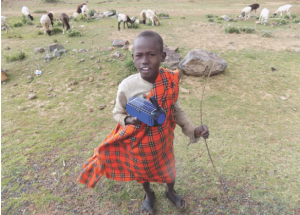
A solar-powered radio allows Tunui Metuni to listen to Trinity FM while tending his family’s livestock in Samburu County, Kenya. Photo by Faith Wanjiru, UM News.
By Faith Wanjiru, UM News –
The Rev. Josam Kariuki of Trinity United Methodist Church in Narok, Kenya, and other clergy began livestreaming worship services and sharing messages of hope during the COVID-19 pandemic. The livestream, however, was only getting to followers who had smartphones.
“A good number of my followers,” he said, “use button phones. Others don’t own mobile phones. I needed to reach them all, especially when they required spiritual, emotional and material support.”
Kariuki decided to start the church’s own radio and television station to reach the most vulnerable communities in slums and the interior areas of Narok with vital information. He created space for the station on the church’s premises.
Though ill-equipped, with only a single video camera and a radio recorder, Trinity Radio and Television has been on the air for a year. Because it is so new, the station is surviving on the goodwill of local churches. Its skeletal staff of eight workers includes six volunteers.
Kariuki is seeking partnerships to help the station remain afloat. Partners could buy video cameras and other equipment or donate solar-powered portable radios and televisions, recorders, transmitters and computers. The pastor is also looking for sponsored programs and media-trained volunteers.
“The sponsored programs and the financial aid,” he said, “will help to train employed staff.” Often, volunteers leave for paid jobs. Another major challenge for the new station is access to remote areas to collect news.
The pandemic, Kariuki said, came with numerous problems due to prolonged school holidays, collapsed businesses, job losses and stay-at-home orders. Many people started working from home.
“This had adverse effects in many slum areas and rural areas of Narok, with a recorded rise in domestic gender-based violence, female genital mutilation, early marriages, teenage pregnancies, child labor and defilements,” he said.
Chief Lesiti Muturo said Trinity Radio and Television instructs the community about their rights and available government resources. Women learn about family planning, the importance of education and other subjects.
After the closure of schools in 2020 because of COVID-19, the church radio station began broadcasting school programs to children in a local language. School-age children, said teacher Paul Sitinei, “enjoy songs, Bible readings and entertainment programs.”
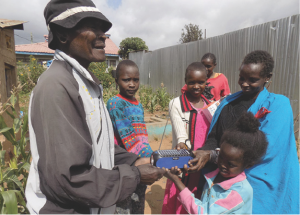
Saloton Ntutu and his family in Narok, Kenya, enjoy listening to Masai songs on Trinity FM. They received the radio as a
donation from Trinity United Methodist Church. Photo by Faith Wanjiru, UM News.
Using the three bilingual stations that broadcast in Kikuyu, Maasai and Samburu, Kariuki said he has planted five new congregations. “We can now preach through the media in our local language,” said Pastor Melisa Soipan of Narok United Methodist Church. “It is impossible to reach our followers through social media like Facebook because there is no internet access.”
Moses Kwaro agreed. “We are proud because we have been remembered and cared for,” he said.
“We are very happy,” leader Tabitha Tumangah said, “because (we) are getting national news in our Maasai language.
This is beneficial to our people who do not understand English and Swahili.” She added that the church’s mission team is mobilizing them to have solar-powered radio because their region lacks electricity.
The radio can be listened to worldwide through the Facebook pages Trinity FM Kenya and Trinity TV Kenya and the website https://umckenya.org/tv/. Trinity Radio and Television reaches the Kikuyu, Maasai and Samburu communities.
Faith Wanjiru is communications director for the Central/Narok District of the Kenya-Ethiopia Conference. For more information, contact Trinity United Methodist Church Mission Coordinator Solomon Kimani at trinity@umckenya.org.

by Steve | Jan 6, 2022 | January/February 2022, Magazine Articles

Photo: Shutterstock
By JJ Mannschreck –
Speaking as a young clergy with a (God willing) long career in front of me, I think it’s important for me to explain why some of us are considering going with the Global Methodist Church (GMC).
1. The Definition of Progressive. There’s a lot of noise being made in the current church conversation about big tents and long tables. Progressive voices and institutionalists are talking about how welcoming they will be for traditionalist voices. “You don’t have to leave” they say, “we will make room for and respect all theologies.” And to be honest, I want to believe them. But if the issue of LGBTQ inclusion is a justice issue – which I’ve heard many, many times – then, at best, what we are going to see is a temporary tolerance.
The definition of progressive is that they understand their ideology as progress. Assimilation is built into their identity. One can assume that they can and will be very kind for a season – but eventually the call of justice will not be content to permit “oppressive theologies” in the room. There will probably be a few years in the Post Separation UM Church (PSUMC) where it will be safe and even comfortable for traditionalist clergy to do ministry. But it will probably get progressively worse for them as the years go by. For those nearing retirement, it might even be the easier choice to stay. But I am not near retirement. I am a young traditionalist clergy. I have no desire to be part of a tradition that will resent me just a little bit more every year for my entire career.
2. United By Mission Alone. It is time for all Methodist traditions (both PSUMC and GMC) to eliminate the Trust Clause. The Trust Clause coerces unity that isn’t really there. The Global Methodist Church has made it clear that autonomy in the local church will be the name of the game, whereas the PSUMC has no intention of getting rid of its hold over congregations. Without a legally binding, practical, and financial threat to keep unity in the ranks, the Global Methodist Church will rely on missional alignment. Rather than being yoked together by rule of law, we will be able to walk next to one another – and work together freely.
3. The Call System (and Guaranteed Appointments). Along with the trust clause, the itinerant system should be eliminated. The current method of appointment for pastors does have its conveniences – but the disadvantages significantly outweigh the advantages. It is a system that can very easily, even if accidentally, breed deep abuse and scandal. Beyond potential abuses, it enables toxic churches and ineffective clergy to point fingers at one another for decades without accountability. I’ve seen this in my own conference in countless examples. The Global Methodist Church is shifting only slightly, to a partial call system. This will be challenging at first. Churches will have a steep learning curve on interviewing pastors. Toxic churches will shrivel and ineffective pastors will struggle to find good churches, but all of those things will ultimately lead to a healthier denomination down the line.
4. Becoming a Minority. I am a very privileged, young heterosexual white man. While I may not come from a fabulously wealthy family and I never had a pony growing up, the reality is that I grew up in extremely comfortable conditions. I believe there is a racial and cultural realignment coming for the church – and I am here for it. I am eager to be a part of a church that is multiracial and where leadership is more equitably shared between Africans, Filipinos, and Caucasians from the United States, Europe, and Russia.
Our African brothers and sisters have lived with a system of inequity for decades. It saddens me to see progressive voices making a lot of noise about regionalization at the exact historical moment when multiracial voices are finding prominence in the power dynamics. Rhetorically, institutionalists talk a lot about diversity – they want Africans in the room – it just seems that they don’t want to have to listen to them. Regionalization is not justice. Make no mistake, it is an injustice issue, and nothing else. The Global Methodist Church, particularly the white conservatives in America, will have a lot to learn in a short amount of time. There is racism buried beneath the surface of some of our congregations, and we will have to deal with that if we are to flourish.
5. Governance Structure – the local Church. The core of my desire for movement to the Global Methodist Church lies in the nitty gritty of church organization. I don’t believe institutionalists or even progressives are bad people. I will miss many of my colleagues, and I wish them blessings in the future from the bottom of my heart. But when I look at the two structures, one system is simply better. For a long time the UM Church has paid lip service to the fact that the front lines of ministry are in the local church. And yet, in my experience and in what I have seen around the country, this is not a practical reality.
In my conference, pastors are actively running away from local church ministry, often seeking out the coveted conference level staffing positions. Despite the financial difficulties and combining of structures, the conference level staff continues to grow. In recent months, they have done a good job of re-orienting back toward the local church, particularly since COVID – but it is still an extremely top heavy structure. There’s a whole lot of apportionment money going to support these massive staffs and the resources they provide (which a majority of churches do not make use of). This is only more pronounced when we consider the massive dollar amounts attached to the work at the General Church level as well.
The Global Methodist Church is offering a far more streamlined organization. In dollars and cents, it will probably cost my church half what it currently does to be a part of that structure. On a practical level, we will send less money up to the denomination, and more money will be left for the local church to do ministry in our community. In rough estimation we expect to move from 14 percent of our budget going up to support the conference down to 7 percent. District Superintendents (or whatever they will be called) will not be seen as a promotional escape from local church ministry, but rather an extra responsibility – possibly on top of local church ministry – taken up as an honor. I have seen some say that the GMC’s Transitional Book of Doctrines and Discipline (which is significantly shorter than the current UMC BOD) is too short. Critics claim that clearly they didn’t think hard enough if they wrote such a streamlined structure. But I look at the bloated structures of the current UM Church and I believe that a simpler way is possible (and preferable).
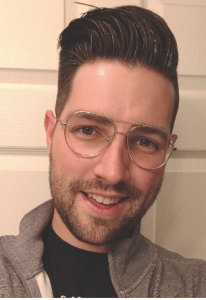 What is not on my list of five points? The conversation about LGBTQ inclusion does not even arise (except perhaps tangentially in the first reason). I do not want to move to the Global Methodist Church because of a disagreement over homosexuality. Despite what progressives have been screaming for years, I don’t “hate” gay people. To be honest, I can easily make this decision without even considering that part of the discussion. I would make my way to the GMC on their call system alone, or their governing structures, or their removal of the trust clause. All of these are practical, straightforward reasons that the Global Methodist Church will be a stronger church in the long run.
What is not on my list of five points? The conversation about LGBTQ inclusion does not even arise (except perhaps tangentially in the first reason). I do not want to move to the Global Methodist Church because of a disagreement over homosexuality. Despite what progressives have been screaming for years, I don’t “hate” gay people. To be honest, I can easily make this decision without even considering that part of the discussion. I would make my way to the GMC on their call system alone, or their governing structures, or their removal of the trust clause. All of these are practical, straightforward reasons that the Global Methodist Church will be a stronger church in the long run.
I know that LGBTQ+ inclusion is the flashy headline. Mainstream media, if they notice this split at all, will talk about how the church is dividing over homosexuality. They have never had much interest in nuance, or really any differences that don’t grab people’s attention. I don’t expect a fair hearing in the public square. Inclusion may have been the lightning bolt that struck the church and lit the roof on fire – but after the flames died down, they revealed a rotting structure set on a leaky foundation. It’s time to build a new house.
For what it is worth, I will be entering through the doorway into the Global Methodist Church, just as soon as they unlock the door.
JJ Mannschreck is the pastor of Flushing United Methodist Church in Michigan.

by Steve | Jan 6, 2022 | January/February 2022, Magazine Articles
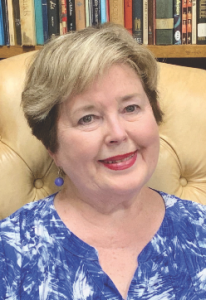 By B.J. Funk –
By B.J. Funk –
Before my mother-in-law left for heaven, she was trapped in her limited body by a debilitating stroke. For five years, she lay motionless in the bed, unable to speak or communicate.
Christmas came. Roy and I traveled from sunny South Georgia to the snow laden streets of Burlington, Michigan, our first time to see his mother after her stroke. Mr. Funk greeted us with a huge hug before we walked into the living room of the old farmhouse, the dark walls mirroring the wood stove’s orange glow. This living room always held family memories, but on this night, it held medicinal memories. Rubbing alcohol, herbal supplements, vapor rub, and others. It had been transformed into a hospital room where Roy’s mother lay. Low lights and complete silence called us to want to turn the darkness to light. But, how? It seemed impossible How are you? sounded cruel. Merry Christmas sounded inappropriate.
As we walked to her bedside, her limited eye contact was startling as was her inability to welcome us. We weren’t prepared for a silent Eleanor Funk. Nor that her left arm would not reach up to welcome us as she lay under the covers. It seemed we had nothing to give her but our stares of unbelief and grief. We felt helpless and overwhelmed.
The next morning, Roy and his dad went outside to repair some farm equipment. I pulled up a chair by my mother-in-law’s left side, gently stroking her soft face. Suddenly, as if guided by an unseen hand, I opened my Bible and began reading the Christmas story from the book of Luke. Likely, my words would fall on unreceptive ears. Even as powerful as these words would be, my heart just wasn’t in it.
“In that region there were shepherds living in the field keeping watch over their flocks by night” (Luke 2:8).
Eleanor moved her head toward mine. Wait a minute! Eleanor moved her head! She looked straight at me! I continued reading. “But the angel said unto them, ‘Do not be afraid. I am bringing you good news of great joy for all people. To you is born this day in the city of David a Savior who is Christ the Lord’” (Luke 2:11).
Eleanor locked eyes with me. Wait a minute! Eleanor locked eyes with me! Her stare never wavered as I continued reading through verse 40, my head bobbing up and down from her eyes to the Bible and back again.
“The child grew and became strong, filled with wisdom, and the favor of God was upon Him” (Luke 2:40).
I could not hold back the tears. Suddenly, the beauty of the Christmas story fell all over me, and it was as if I were hearing this Scripture for the first time. I drank in the truth that God loved me enough to send a Savior.
She still watched as I grabbed a tissue. We were now sitting – not in a room of medicinal odors – but in the very presence of God. Eleanor and I had suddenly stepped off of earth and onto Holy Ground. Then, the real miracle happened.
I heard the sheet rustling as Eleanor slowly moved her left arm out from the covers and reached for my hand. We sat there, caught in a divine moment. Our eyes were locked and our hands warmed in the other’s embrace. I didn’t say anything. She couldn’t say anything. It was the most beautiful conversation I ever had with my Mother-in-Law.
Every day we were there, I read the Bible to her. Other family members took their turn. For those of us gathered around her bedside, we learned anew the true meaning of Christmas. It was not in the Christmas tree. There wasn’t one. Nor in cookies. There weren’t any. Nor in presents or lights.
The essence of Christmas, however, shone around her bedside, its brilliance warming our hearts and causing us to reevaluate, even to rededicate our lives in those short hours with Eleanor. Christmas was everything it needed to be. Jesus was everything he needed to be. He was and is all the world to mankind. As he was to Eleanor. As he is to you. As he is to me. It was a sufficiet Christmas indeed! In fact, more than sufficient.
BJ. Funk is Good News’ long-time devotional columnist and author of It’s A Good Day for Grace, available on Amazon.

by Steve | Jan 6, 2022 | January/February 2022, Magazine Articles
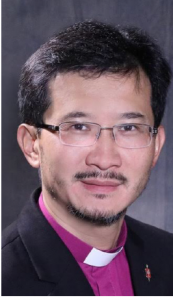 By Bishop Eduard Khegay –
By Bishop Eduard Khegay –
I was born and raised in Almaty, Kazakhstan (former Soviet Union). My ancestors come from an undivided Korea four generation back to the 1860s. I became a Christian in 1992 when I was a student at Moscow State Tech University shortly after the collapse of the Soviet Union. God blessed me richly. I studied in the USA for my M.Div. and D.Min. degrees and met so many wonderful people. In other words, I have Korean blood, Central Asian upbringing, American and Russian education, and a Russian soul.
God has given me the privilege to send and receive missionaries, be part of mission teams in different countries, experience different cultures and languages, do training events, and hear powerful testimonies. The mission movement has the power to change lives, and I want to be part of God’s mission in the world.
The last 30 years have taught me some important lessons from the mission movement in the post-Soviet context. They include many blessings and also problems. And they are often intertwined together. Let me just briefly touch on the few of them.
1. Language, culture, and mentality. There is a powerful scene in Steven Spielberg’s 2004 movie The Terminal when the main hero, Viktor Navorski (played by Tom Hanks) from fictional Krakozhia, helps a Russian man, Mr. Milodragovich, who wants to bring medicine to his ill father in Canada. Frank Dixon, the Acting Field Commissioner of the airport, wants to confiscate the medicine because Mr. Milodragovich has no medicinal purchase license. But Viktor Navorski tells the commissioner that this medicine is actually for a goat. This would allow a person to take the medicine onboard without needing a license. The commissioner understands that Viktor is lying and asks him why about his actions and why he helps a man he does not even know. This scene makes me laugh and cry at the same time. It caricatures the Russian and American men to the point of extremes. But the point is well taken. We grow up with our own language, culture, and mentality, and sometimes it is hard to understand a person from a different country and why they behave the way they do.
I admire missionaries who come to our land and study our language, culture, and mentality. All these things define the way we think and feel. When someone speaks my language and understands our jokes, I feel that this person is one of us and the connection gets much stronger. If someone respects Leo Tolstoy and Fyodor Dostoevsky or Rakhmaninoff and Tchaikovsky, I pay attention to this person and what he or she has to say about God.
On the other hand, it is sad to see missionaries who make little effort to learn the local language and understand our culture. Of course, some people have more talent for learning foreign language than others. But even with limited vocabulary and genuine interest for local culture and the people, a missionary can be effective.
Another issue is using an interpreter. Often times I was the one. Besides the issue of quality of translation and integrity of the interpreter, people may perceive the missionary as a rich foreigner who hires others to do the job. In the context of a poor economy, it may inadvertently create power or status differentiation which did not exist before. And a missionary may not even be aware of that.
2. Reaching goals, building relationships. Most of us who grew up in the Soviet time experienced an authoritarian leadership style which implied that the Communist party sets goals for you. You didn’t have to think and worry about your future. Some people of my generation who were born in the 1970s still have a hard time to dream their own dreams. So, when Western missionaries came to our land and introduced goal setting, strategic planning, and SMART and SWAT analysis, silence was the predominant reaction from our people. It took us many years to figure out how to work with this new paradigm, and we are still on the journey.
Generally speaking, our sisters and brothers from the West were people who wanted to get things done, while our local people value more relationship building. If you come from a place with many resources to a poorer place, you see many possibilities to improve life and your compassionate instincts move you to act. Local people may admire you and follow your leadership until you realize that the future of your mission may seem uncertain after you leave.
It is much harder to invest in building relationships and patiently wait when local leaders would have their own dreams and strategic plans. But isn’t genuine discipleship about building relationships? Westerners feel that we go to extremes and drink too much tea and don’t reach the goals. And they are right. We do talk a lot. We need to work more. But going to another extreme – reaching your goals and missing building relationships – can damage our mission as well. My hope is that mutual learning and edification can help us build great teams for God’s mission both in the West and in the East.
3. East or West, which is the best? The politics of the world’s powerful countries is very polarizing today. I often feel that we are in an era of the Second Cold War. If you are in Russia and speak highly of a Western country, many people may perceive you as traitor. If you are in the USA and speak highly of Russia, you may get in trouble with your friends and colleagues. Is there a Christian way to deal with that? And how can we join God’s mission that will transform people’s hearts and minds so that they can see every human being as a child of God regardless of citizenship?
Nikolai Berdyaev (1874-1948), Russian religious philosopher, wrote in the beginning of the twentieth century that Russian thinking cannot be Eastern or Western. He argued that both of these extremes are not appropriate. His hope for Russia was that she would grow to global leadership and wake up the inner creative activity of the people. We as a church also cannot be Eastern or Western. We are called to be together and bless one another whether we come from East or West, North or South.
Unfortunately, the declining number of mission teams to Russia (even before the pandemic) suggests that the scary politics portrayed by the mass media puts brakes on the mission work internationally. Some people buy cheap news, argue about what is best: East or West, and lose focus on God’s mission.
The Bible challenges us today: “The light shines in the darkness, and the darkness has not overcome it” (John 1:5). The mission of God is about sharing our light with others, especially those who suffer from darkness of spiritual, economic, political and social oppression and deprivation.
Who will go for God and whom shall he send today to share light, build relationships, and learn language, culture and mentality of God’s people?
Bishop Eduard Khegay is the Resident Bishop of Eurasia Episcopal Area in the Northern Europe and Eurasia Central Conference of The United Methodist Church. This is the second of a series of articles provided by TMS Global to platform some important voices in global Methodism.

by Steve | Jan 6, 2022 | January/February 2022, Magazine Articles

Photo: Shutterstock
By Heather Hahn, UM News –
What does a predicted denominational split and an unpredictable pandemic mean for The United Methodist Church’s bottom line? The General Council on Finance and Administration board grappled with that question as members revisited the denomination-wide budget that will go before the coming General Conference.
The finance agency board already was preparing to send the lawmaking assembly the lowest budget in more than 30 years. On December 1, by an 18-1 vote, the board approved shrinking the proposed four-year budget even further to a total of about $407.3 million for the years 2023-2026.
That marks a cut of nearly 33 percent – a third – from the budget General Conference approved in 2016 to support denomination-wide ministries.
The current proposal also would be the lowest budget submitted to General Conference since 1988, according to the denomination’s Commission on Archives and History. At the time, the denomination had about 3 million fewer members than today and had yet to establish Africa University, now supported by denominational funds.
Still, board members stressed that the budget proposal remains very much a work in progress and could change further. They are trying to get a clear picture of what the denomination’s financial base will look like in the near future – and a fog of unknowns clouds their view.
After decades of intensifying debate over LGBTQ marriage and ordination, the coming General Conference faces multiple proposals for a denominational separation. But no person knows how many congregations will depart if a plan of separation passes. Similarly, no one can say when the deadly pandemic will stop upending lives.
“They are projections for things we’ve never done before,” said Christine Dodson, GCFA board vice president who serves on the denomination’s Budget Advisory Team. She also is the treasurer and business manager of the North Carolina Conference. “We don’t have data on how a pandemic and disaffiliation are going to impact our churches moving forward.”
The board does have the educated guesses by leaders of U.S. conferences, the regional bodies that provide the lion’s share of funding for denomination-wide ministries. Both in 2020 and this year, GCFA surveyed conference treasurers, bishops, district superintendents and others to get their best sense of the financial impact of congregational disaffiliations.
Based on this year’s survey, the finance agency now estimates the denomination stands to lose about 25.5 percent of U.S. local church net expenditures by 2025. That’s a bigger loss than projected in last year’s survey, which only asked for estimates through 2024.
The survey results do not mean that conferences expect more than a quarter of U.S. United Methodist churches to depart or close during the next four years. Net expenditures can vary widely by congregation and by circumstance.
What the results do mean is that conference leaders forecast that church departures and closures will result in a substantial decline in one of the key factors used in determining the denomination’s budget.
As it stands, some churches already are leaving without waiting for General Conference to act. GCFA reports that in 2020, 32 U.S. congregations disaffiliated from The United Methodist Church. But that represents only a tiny fraction of the denomination’s more than 31,000 United Methodist churches nationwide.
The Rev. Steve Court, GCFA board member and director of connectional ministries for the East Ohio Conference, told the board that he thought the net-expenditure estimates might be overly negative about what the future holds. “I just want to keep highlighting that because it has real ministry impacts about the level of cutting that we do at this point,” he said.
North Texas Conference Bishop Mike McKee, GCFA board president, agreed with Court that the estimates were far from definitive. McKee said conference leaders tend to answer the disaffiliation question very differently depending on their role. “This is going to be very difficult to forecast,” McKee said. “I’m of the opinion that people will walk more than churches will.” However, he added, that he does not know of any better way to make budget projections.
Heather Hahn is assistant news editor for UM News. Adapted from UM News.





 What is not on my list of five points? The conversation about LGBTQ inclusion does not even arise (except perhaps tangentially in the first reason). I do not want to move to the Global Methodist Church because of a disagreement over homosexuality. Despite what progressives have been screaming for years, I don’t “hate” gay people. To be honest, I can easily make this decision without even considering that part of the discussion. I would make my way to the GMC on their call system alone, or their governing structures, or their removal of the trust clause. All of these are practical, straightforward reasons that the Global Methodist Church will be a stronger church in the long run.
What is not on my list of five points? The conversation about LGBTQ inclusion does not even arise (except perhaps tangentially in the first reason). I do not want to move to the Global Methodist Church because of a disagreement over homosexuality. Despite what progressives have been screaming for years, I don’t “hate” gay people. To be honest, I can easily make this decision without even considering that part of the discussion. I would make my way to the GMC on their call system alone, or their governing structures, or their removal of the trust clause. All of these are practical, straightforward reasons that the Global Methodist Church will be a stronger church in the long run. By B.J. Funk –
By B.J. Funk –  By Bishop Eduard Khegay –
By Bishop Eduard Khegay – 